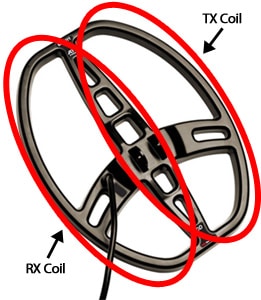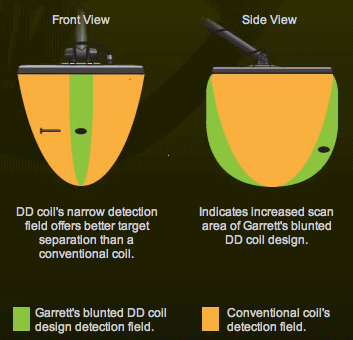Choosing the right coil type is crucial for achieving optimal results. Two widely used coil types are the DD coil and the concentric search coil. While both of these coils have their own advantages and disadvantages, understanding the differences between them can help you choose the best tool for your metal detecting needs. In this article, we will delve into the dissimilarities between the DD coil and the concentric search coil.
Concentric coil vs DD coil

Concentric coils tend to dominate the market whereas mono, imaging and 2-box coils are typical found in specialty detectors. Concentric coils come stock on popular metal detectors such as the Garrett ACE 300 and Fisher F22. DD coils come stock on some newer models such as the Garrett AT Pro and Garrett AT Max.
Here are some of the benefits a DD coil has over the traditional concentric coils:
- Better performance in areas with highly mineralized soil and ground interference.
- Superior target separation by nature of the narrow magnetic field generated by the DD coil. Target ID separation refers to a coil’s ability to distinguish between a good target when it is buried close to another bad target (ie a silver quarter buried next to a bottle cap. Without solid target ID, these close targets could register as one bad target not worthy of digging and we’d never recover the silver quarter!).
- More precise pinpointing accuracy as a result of the overlapping “hotspot”’
- Enhanced depth and search field penetration in mineralized soil
The photo below illustrates the different detection fields generated by the DD vs concentric coils.

Notice the narrow green field depicted in the front view of this image. This represents the positive detection field of the DD configuration with the remaining coil diameter utilizing a negative detection field that provides cancelation of ground signals. The yellow, cone-shaped field depicts the detection field found in concentric coils. The field is much larger which makes it far inferior to the DD coil for target ID separation.
It is important to note that when comparing the depth of DD vs concentric coils that are the same size in ground that is NOT mineralized, the concentric coil will perform better because of it’s larger search field. The larger search field provides more sensitivity, which provides greater depth.
Because concentric coils will gain better depth from a comparably-sized DD coil, DD coils are typically built to be larger overall to make up the difference (ie 7×11″ coils).
Metal detector coil types
There are 5 types of coil configurations for metal detectors:
- Concentric
- DD
- Mono loop
- Imaging
- 2-box
There’s a common misconception that the outward appearance of the coil indicates the type of configuration. What makes these coil configurations different from one another is the arrangement of the transmitter and receiver copper wiring housed within the coil itself. For example while the coil seen to the right appears to be DD, it very well could be a concentric configuration.
Are DD coils better?
So when should you buy a metal detector with a DD coil and/or upgrade to a DD? Generally speaking the DD is best used while prospecting for gold, and relic hunting due to the type of mineralized ground typically found in these hunting methods. You may also consider the DD coil when you’re in areas with an abundance of trash where you need to cover a lot of ground and a sniper coil just won’t do the trick.
Good luck and happy hunting!
